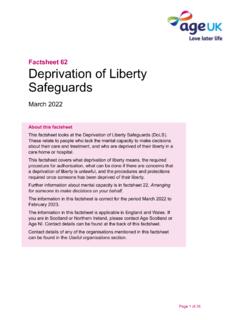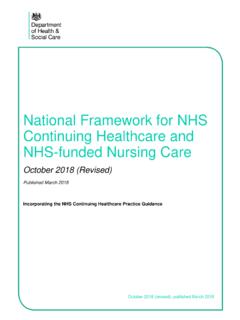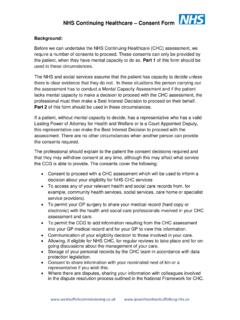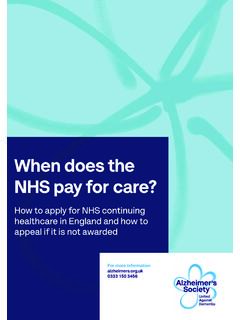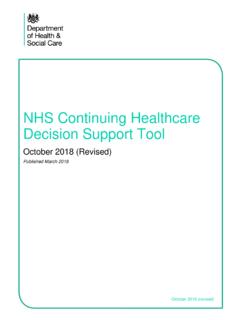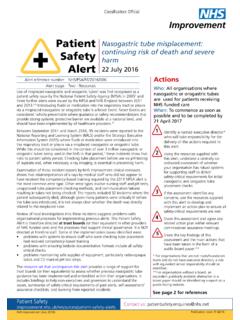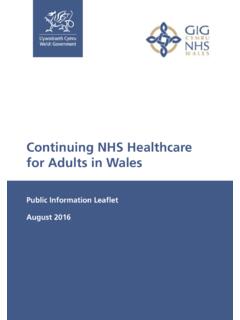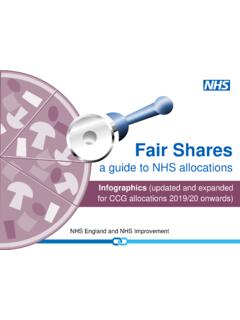Transcription of NHS Continuing Healthcare and NHS-funded nursing care
1 Page 1 of 36 Factsheet FS20 NHS Continuing Healthcare and NHS-funded nursing care October 2021 About this factsheet This factsheet explains what NHS Continuing Healthcare is; how the NHS decides whether you are eligible for it, and what to do if unhappy with an eligibility decision. It explains the effect of Covid-19 pandemic on undertaking assessments, particularly when involving hospital discharge. It explains NHS-funded nursing care a weekly payment NHS makes to nursing homes towards their costs of providing nursing care to residents. The following factsheets may be of interest: 6 Finding care at home 10 Paying for permanent residential care 22 Arranging for others to make decisions on your behalf 37 Hospital discharge 38 Property and paying for residential care 39 Paying for care in a care home if you have a partner 41 How to get care and support 76 Intermediate care and reablement The information in this factsheet is applicable in England.
2 If you are in Northern Ireland, Scotland or Wales, please contact Age NI, Age Scotland or Age Cymru for advice. Contact details can be found at the back of this factsheet. Contact details for any organisations mentioned in this factsheet can be found in the Useful organisations section. Age UK factsheet 20 October 2021 NHS Continuing Healthcare and NHS-funded nursing care Page 2 of 36 Contents 1 Recent developments 4 2 Continuing care terminology 4 3 NHS Continuing Healthcare 4 What is NHS Continuing Healthcare ? 4 What is the National Framework? 5 How is NHS CHC eligibility decided? 6 Who decides NHS CHC eligibility and funds your care? 9 Routes to reaching an NHS CHC decision 9 Getting an assessment 9 4 National Framework principles 10 Person-centred approach involving you and your carers 10 Seeking consent to the assessment process 10 Consent and mental capacity 11 Confidentiality and sharing information 12 5 Process for reaching an eligibility decision 12 Apply the Checklist 12 Undertake a full multi-disciplinary needs assessment 15 Complete the Decision Support Tool (DST)
3 16 Reaching a decision 18 Joint package of health and social care 19 6 Care planning when eligible for NHS CHC 19 If you lack capacity to consent to a care plan 19 Your care package and options 20 Personal Health Budgets and NHS CHC 22 If unhappy with your NHS CHC care package 24 7 Using the Fast Track Tool 24 8 NHS Continuing Healthcare reviews 25 9 Challenging an eligibility decision 26 Age UK factsheet 20 October 2021 NHS Continuing Healthcare and NHS-funded nursing care Page 3 of 36 Submitting a request for a review of the decision 26 Review process 26 10 Effect on benefits of NHS CHC funding 28 11 Care planning if you have a negative Checklist 29 12 Retrospective reviews of NHS CHC eligibility 29 13 Refunds if NHS should have paid for your care 29 14 NHS-funded nursing care 30 How is eligibility for NHS-funded nursing care decided?
4 31 NHS-funded nursing care payments 31 Review of NHS-funded nursing care needs 32 Admission to hospital or a short stay in a nursing home 33 Useful organisations 34 Age UK 35 Support our work 35 Age UK factsheet 20 October 2021 NHS Continuing Healthcare and NHS-funded nursing care Page 4 of 36 1 Recent developments The NHS-funded nursing care single band rate for year starting 1 April 2022 is a week. If you moved into a nursing home before 1 October 2007 and are on the high band, it is a week. 2 Continuing care terminology Health and social care professionals use these terms to describe support from the NHS and local authority social services department. NHS Continuing Healthcare a complete package of on-going NHS and social care support, arranged and funded by the NHS. Continuing NHS and social care - ongoing care package involving free NHS services and means-tested social care services.
5 It may be called a joint package of care . Terminology and abbreviations used in this factsheet Residential home refers to a residential care home, nursing home to a care home registered to provide nursing care. We use care home in this factsheet to refer to both, unless referring to a nursing home specifically. NHS CHC refers to NHS Continuing Healthcare , NHS-FNC to NHS-funded nursing care, DST to Decision Support Tool, CCG to Clinical Commissioning Group, LA to local authority, PG practice guidance. 3 NHS Continuing Healthcare If you have significant ongoing care needs, it is not always clear whether responsibility to meet your needs lies with the NHS or local authority. The Department of Health and Social Care National Framework for NHS Continuing Healthcare and NHS-funded nursing care standardises the process staff in England must follow when deciding this.
6 NHS services are free, whereas those arranged by social services are means-tested. What is NHS Continuing Healthcare ? NHS CHC is an ongoing package of care that is funded solely by the NHS, if you are aged 18 or over, and found to have a primary health need . It is provided to meet needs arising because of disability, accident, or illness. Sections and describe the process staff must follow to reach a decision. Primary health need is explained in section Age UK factsheet 20 October 2021 NHS Continuing Healthcare and NHS-funded nursing care Page 5 of 36 Your package must meet your assessed health and associated social care needs and include accommodation if that is part of your overall need. You can receive NHS CHC in any appropriate setting, but it is usually at home or in a residential setting such as a care home. What is the National Framework?
7 The National Framework for NHS Continuing Healthcare and NHS-funded nursing care applies in England. It: sets out principles and processes staff must follow when deciding eligibility for NHS Continuing Healthcare . See sections 4, 5, 7 and 8. provides tools staff must use and complete to support decision-making the Checklist Tool, Decision Support Tool (DST) and Fast Track Tool. See sections , and 7. provides common paperwork the tools above must be used for recording evidence that informs decision-making. sets out the process for challenging eligibility decisions. See section 9. clarifies the interaction between assessment for NHS CHC and NHS-FNC. For information on NHS-FNC, see section 14. The Framework document also includes numbered Practice Guidance (PG) in Q&A format, to support staff who assess and deliver NHS CHC.
8 Standing Rules Regulations and Directions underpin the Framework and carry the force of law. The Framework and tools are at Understanding the decision-making process The organisation Beacon can help you navigate and understand the decision-making and appeals process. They offer up to 90 minutes free, independent advice funded by NHS England. It is helpful to be familiar with the Checklist and DST, especially if you or a family member is to be present when they are used. The flowchart on page 7 outlines the overall process of the assessment for NHS CHC. There is a 20 minute NHS video explaining the NHS CHC process at A public guide to NHS CHC is available at Dementia The Alzheimer s society produce guidance about approaching NHS CHC assessment specifically relating to people who have dementia. Age UK factsheet 20 October 2021 NHS Continuing Healthcare and NHS-funded nursing care Page 6 of 36 The guidance provides tips and advice about how to prepare for the assessment, see How is NHS CHC eligibility decided?
9 An NHS CHC eligibility decision is based on your day-to-day needs. It rests on deciding whether the main aspects, or the majority part of the care you need, is focused on addressing and/or preventing health needs. If it does, it means you have a primary health need . Having a particular diagnosis does not determine eligibility - people with the same health condition can have very different needs. There is no need for specialist staff to be providing care. However, staff contributing to your assessment must have relevant skills, knowledge about and an understanding of your underlying condition(s). The term primary health need is from a 1999 Court of Appeal case known as Coughlan Judgment. The judge found there was a limit on nursing care assistance a LA could legally provide. When taken as a whole, nursing or other health services you require are: no more than incidental or ancillary to the provision of the care and, if required, accommodation which a LA is, or would but for your means (income/capital), be under a duty to provide (the quantity test ), and not of a nature beyond which a LA, whose primary responsibility is to provide social services, could be expected to provide (the quality test ).
10 When considering NHS CHC eligibility, staff look at key characteristics of your needs in the 12 areas featured in the Checklist and DST, and their impact on the care you require. This is to help determine whether the care you require exceeds the limits of a local authority s responsibilities. The 12 areas are listed in section The key characteristics are: Nature - the type and features of your needs - physical, psychological or mental - and type of support or treatment needed to manage them. Intensity - relates to the severity of your needs, how frequently and to what extent they vary, and the resulting level of support required. Complexity - how different needs present and interact with each other to increase the knowledge and skills staff need to a) monitor symptoms b) treat any multiple conditions; and how this affects management of your care.





